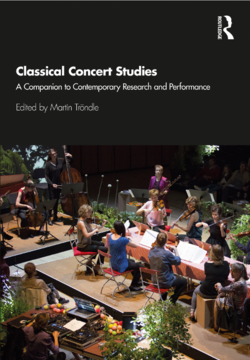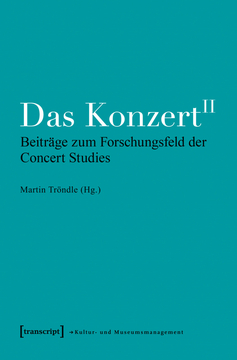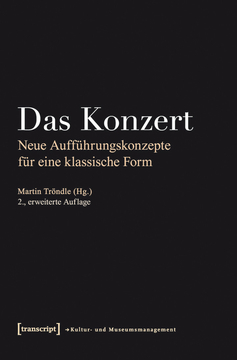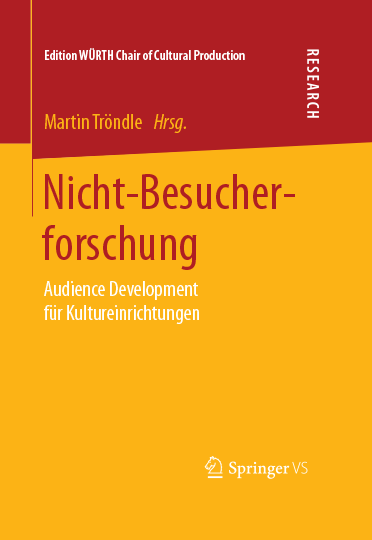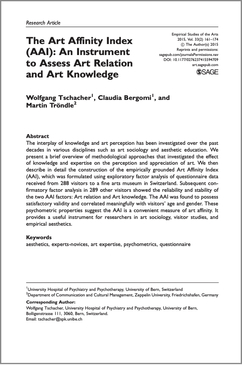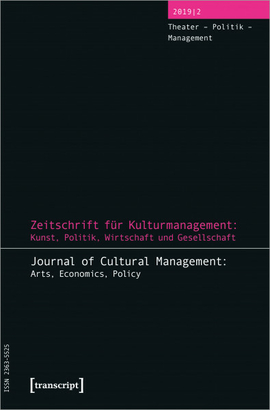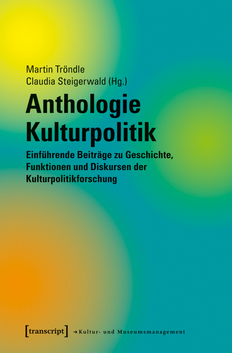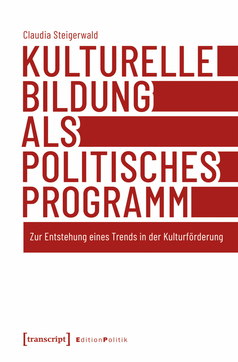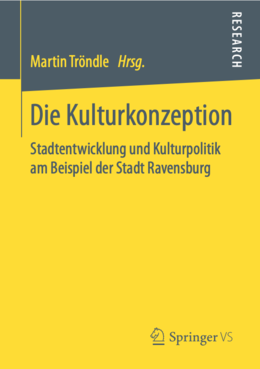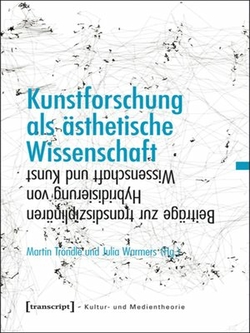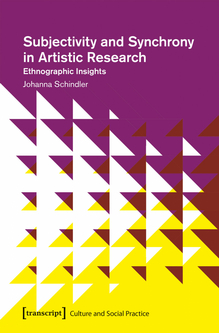The Chair’s Thematic Profile
Real-world issues do not adhere to the narrow boundaries of scientific disciplines.
In its research and teaching activities, the chair deals with a broad range of topics centred around the production and reception of the “arts and culture”. Those include: Audiences and visitors of arts organisations and the aesthetic experience—disciplinarily located in the field of cultural sociology and psychology of the arts; the production of artistic formats and programming—here organisational sociology as well as aspects of aesthetics and staging/dramaturgy come into play; as well as funding of the arts and its legitimation—that is, questions of cultural policy. Why does the state promote culture, why does it do so, and on the basis of which idea of the term “culture”?
Given this diversity in research areas, the chair makes use of the theoretical frameworks relevant in each of the various disciplines. This is not to be understood as eclectic; rather, it is a way to acknowledge the differentiation of the sciences and to manifest an interest in other bodies of knowledge and different research cultures. The chair’s activities are problem-oriented. This almost naturally entails an inter- and transdisciplinary orientation, which also is also reflected in the involvement of external partners in the chair’s teaching and research activities.
Key topics in research and teaching are:
Concert Studies
Why can classical concerts be so incredibly boring?
Unfortunately, this question is rarely asked from the side of concert organisers. The chair examines the concert in terms of its dramaturgical, aesthetic, performative, social and economic parameters and asks how the classical concert form can be updated and rethought from a contemporary perspective. “One must transform the concert in order to preserve it”—this is one of the chair’s premises. With this in mind, the chair has established “concert studies” as a field of research (in analogy to the field of “museum studies”) in theory and practice, thus contributing to the concert as a cultural form.
Projects in the Area of Concert Studies
The chair is currently home to the
research project “ECR – Experimental Concert Research” funded by the VolkswagenFoundation’s “Off the Beaten Track” initiative.
The project explores the effects of various presentation formats using the
example of the classical concert.
The classical concert is
a highly sophisticated format of performance and reception. Which parameters of
its highly ritualised sequence of events are topical, which others are
irrelevant or even obstructive to experiencing and immersion? ECR aims to
explore the potentials of music experience in this setting, and ultimately find
out what constitutes the concert experience in a classical music concert.
But how can one measure musical experience? The project combines a set of existing methods with new approaches. Before each concert, the audience will be equipped with sensors that measure various body signals that have been identified as good indicators of emotional arousal in music psychological research (such as skin conductance or heart rate variability). Directly after the concert, the people in the audience as well as the musicians will be interviewed in detail. In addition, the audience will be filmed in order to be able to analyse both facial expressions and motion energy. One can assume that by combining these various techniques of collecting behavioural, subjective experience and physiological data, the project will yield the most comprehensive and differentiated picture possible of the musical experience of the people in the audience.

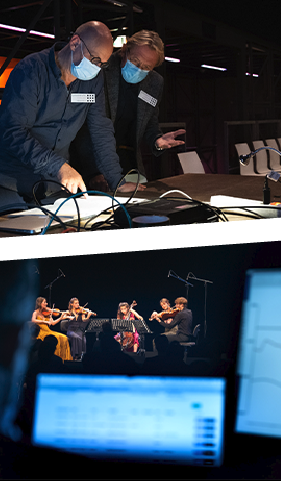
In the past years, various concert halls, festivals, and private providers have developed audiovisual (live) streaming services. Originally, the motivation for these new services was to overcome the “crisis” of the classical concert or to launch new business models. Often, the main assumption was that digital offers could attract a new and younger audience that would not have attended a ‘conventional’ live concert. Through and during the current pandemic, however, this view is changing: Digital formats are currently the only way for cultural institutions to reach out to and hold their audience’s attention. Out of necessity, a variety of additional streaming services have emerged.
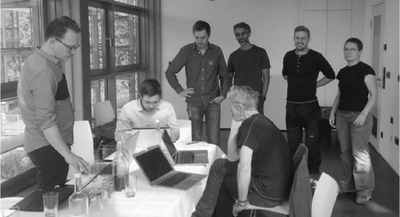
However, which of these offers is affective in what way, and which ones could actually be promising for the future is an almost unexplored question. Further, how the concert business can continue to assert itself as a cultural form and social forum under the rapid pressure of digital change is a current and essential question for musicians and concert houses as well as for cultural policy. With the “Digital Concert Experience” (DCE), which is a seamless extension of and complement to the Volkswagen Foundation’s “Experimental Concert Research” (ECR) project, an interdisciplinary working group will test the effects of various streaming concert formats. This way, the effect of digital concert formats (DCE) can later be contrasted with the effect of analog concert formats (ECR). DCE and ECR creates an internationally unique data set to understand the concert as a cultural form and its digital transformation.
Concerto²¹ is aimed at those who are thinking about new performance concepts for classical music and want to assert themselves on the market with innovative concert formats. Alfred Toepfer Stiftung has been organising this extraordinary master class for musicians and festival organisers since 2009, with Martin Tröndle as its Spiritus Rector.

Selected Publications in the Area of Concert Studies
- Tröndle, Martin (2020). Classical Concert Studies: A Companion to Contemporary Research and Performance, New York City, Routledge, 416 pages. Further information
- Tröndle, Martin (2018). Das Konzert II: Beiträge zum Forschungsfeld der Concert Studies, Bielefeld, transcript, 490 pages. Publisher website
- Tröndle, Martin (2009). Das Konzert: Neue Aufführungskonzepte für eine klassische Form, Bielefeld, transcript, 2nd extended edition, 398 pages. Publisher website
- Christian Weining (since 2019) | “(Konzert-)Hörertypologien” | Further information
Museum Studies
Have you ever had an
“art feeling”?
Is it the piece itself or its hanging or positioning in the room that determines its effect? Which influence does the viewer’s background knowledge or a certain “expert knowledge” have on the reception of art? And how does visitor behaviour affect art reception? The project “eMotion – mapping museum experience” was the first experimental investigation worldwide to investigate the effect of various exhibition and performance practices on visitors.
Projects in the Area of Museum Studies
Research Project “eMotion – mapping museum experience”
The long-term international research project “eMotion – mapping museum experience” investigated questions on the interaction of space, object and visitor in a museum of art. The main focus has been on the psycho-geographic effects of the museum and its objects on the museum visitors’ experience. eMotion was funded by the Swiss National Science Foundation and is—until today—one of the largest research projects investigating the art experience in a museum space using an interdisciplinary approach.


Selected Publications in the Area of Museum Studies
- Tröndle, Martin (2014). Space, Movement and Attention. Affordances of the Museum Environment. International Journal of Arts Management, 17(1), 4-17. Further information
- Tröndle, Martin / Kirchberg, Volker / Tschacher, Wolfgang (2014). Is this Art? An experimental study on visitors’ judgment of contemporary art. Cultural Sociology, 8(3), 310-332. Further information
- Tröndle, Martin / Kirchberg, Volker / Tschacher, Wolfgang (2014). Subtle Differences: Men, Women and their Art Reception. Journal of Aesthetic Education, 48(4), 65-93. Further information
- Tröndle, Martin / Greenwood, Steven / Bitterli, Konrad / van den Berg, Karen (2014). The Effects of Curatorial Arrangements. Museum Management and Curatorship, 29(2), 1-34. Further information
- Tröndle, Martin / Wintzerith, Stéphanie / Wäspe, Roland / Tschacher, Wolfgang (2012). A museum for the twenty-first century: the influence of ‘sociality’ on art reception in museum space. Museum Management and Curatorship, 27(5), 1-26. Further information
Visitor- and Non-Visitor Studies
Newly developed research designs have in many ways promoted novel insights about visitors of cultural institutions, the way they receive art and their motivations to visit art organisations. The results of the chair’s projects have already generated widespread academic interest and broad media coverage.
Selected Publications in the Area of Visitor- and Non-Visitor Studies
- Tröndle, Martin / Tschacher, Wolfgang (2016). Art Affinity Influences Art Reception (in the Eye of the Beholder). Journal of Empirical Studies of the Arts, 34(1), 74-102. Further information
- Tschacher, Wolfgang / Bergomi, Claudia / Tröndle, Martin (2015). Art Affinity Index: An Instrument to Assess the Relation to Art and the Knowledge of Art. Journal of Empirical Studies of the Arts, Vol. 33(2), 161-174. Further information
- Kirchberg, Volker / Tröndle, Martin (2015). The Museum Experience: Mapping the Experience of Fine Art. Curator – The Museum Journal, 58(2), 169-193. Further information
- Kirchberg, Volker / Tröndle, Martin (2012). A Review of Studies on Visitor Experiences in Museums. Curator – The Museum Journal, 55(4), 435-452. Further information
- Tröndle, Martin / Tschacher, Wolfgang (2012). The Physiology of Phenomenology: The Effects of Artworks. Journal of Empirical Studies of the Arts, 30(1), 75-113. Further information
- Tschacher, Wolfgang / Greenwood, Steven / Kirchberg, Volker / Wintzerith, Stéphanie / van den Berg, Karen / Tröndle, Martin (2012). Physiological Correlates of Aesthetic Perception in a Museum. Journal of Psychology of Aesthetics, Creativity, and the Arts, 6(1), 96-103. Further information
- Tröndle, Martin (2019). Nicht-Besucherforschung. Audience Development für Kultureinrichtungen, Wiesbaden, Springer VS, 138 pages (Edition WÜRTH Chair of Cultural Production) Publisher website
Cultural Management Research
What does professionalisation mean in the context of the cultural sector? And how much professionalisation can a sector that—due to its inherent logic—has to elude economically driven managerialisation processes, stand? What distinguishes (non-profit) cultural organisations from profit-oriented organisations? And if money is not a decisive criterion to take a decision—how are decisions taken? Cultural management has to be more intelligent than the how-to literature usually promises, since the challenges one faces during the production of aesthetic events are complex.
Selected Publications in Cultural Management Research
Journal of Cultural Management and Cultural Policy
The Journal of Cultural Management and Cultural Policy is dedicated to international perspectives that address a wide range of issues in cultural management and cultural policy research and practice. It invites articles that reflect on organisational structures of creative enterprises, economic and managerial issues in the arts, cultural policy in all its dimensions, as well as creative and aesthetic processes in cultural production, distribution and perception.
Past issues:
| Museum – Management – Politics
| Creative Cities Off the Beaten Path
| Theatre – Politics – Management
| Cultural Leadership
| Aesthetics of Economy
| Evaluation in the Cultural Sector
- Tröndle, Martin (2006). Entscheiden im Kulturbetrieb: Integriertes Kunst- und Kulturmanagement. Bern: h.e.p.
- Tröndle, Martin (2010). Systemtheorie, ein Versuch. In: Bekmeier-Feuerhahn et al. (Ed.): Theorien für den Kultursektor. Jahrbuch Kulturmanagement 2010. Bielefeld: transcript, pp. 13-42. Publisher website
- Tröndle, Martin (2006). What Difference do You Make? Questions of Ethics and Social Responsibility for Arts Administrators. In: ENCATC (Ed.): ”What makes Sense?“ Culture Management and the Question of Values in a Shifting Landscape. Brüssel, pp. 59-70.
- Tröndle, Martin (2008). Restart. Paradigmen und Paradigmenwechsel im Kunst- und Kulturmanagement. In: Hatz, Christine et al.: spiel plan: Schweizer Jahrbuch für Kulturmanagement 2007/08. Bern, Stuttgart, Wien: Haupt, pp. 61-74.
- Julian Stahl (since 2019) | “Organisierte (Un)Ordnung – Kulturorganisationen in der Netzwerkgesellschaft” (Organized (Dis)Order – Cultural Organisations in the Network Society) | Further information
- Leticia Labaronne (2015-2018) | “(Re-)presenting Artistic Performance: A Contextualized Framework for Evaluating Performing Arts Organizations” | Further information
Cultural Policy Research
With its more than
60 opera houses, approximately 130 state and city orchestras, 4,000 museums,
libraries, art and music schools, there is no other country in the world that
spends as much public money on funding for the arts and culture as Germany does.
It is therefore even more surprising that cultural policy research in Germany has
been a rather marginal topic until today. Why is that? Which
actors/stakeholders form the field of cultural policy discourses? With what
motivations? What effect does this have on cultural production?
Despite
the huge amount of public resources invested in the arts, cultural policy
research in Germany is a rather marginal area of study.
Why is this so?
The question about
the function the arts and culture should have in and for society is usually negotiated
in funding guidelines and political position papers. Since the 1970s, Germany
has seen the development of temporary funding formats aimed at realising
projects and programming, which are geared towards distinct goals and need to
offer a theoretical justification for why they should receive funding. This logic
resulted in official cultural political guiding principles such as “Audience
Development,” which are still present in current policy papers and funding
guidelines. But how do such principles and positions papers come about? How are
the institutionalised? And what effect do such principles have in terms of organisational
changes and changes of self-conception ? How could cultural policy and urban
development be redesigned to go beyond traditional ways of cultural development
planning?
Projects and Initiatives in the Field of Cultural Policy Research
Keywords like globalisation, demographic changes, digitalisation and the transformation of work and daily life, climate change, the European Union and democracy are often used to contextualisecontemporary social upheavals.
Against this background, the role of cultural institutions, cultural policy and cultural work is facing profound changes, too.
The research cluster therefore investigates the connections between social developments and the potential future forms of art and cultural production, distribution and perception.
Cultural institutions, their visitors and cultural policy are interdependent and intertwined. The questions the cluster addresses therefore demand complex, multi-perspective thinking and analysis. It is therefore composed by international scientists and practitioners who work across disciplines and generations.
In some countries (like the USA, Poland, Hungary, Italy, the UK, Israel, Greece), populist or nationalist political movements are questioning the social value of publicly funded art and culture. How does the (radical) political repositioning of these states affect their cultural policies? How do budget cuts, censorship and media control, a narrow understanding of the notion of culture as well as attempts at exercising political control over the management staff of cultural institutions influence the cultural production in and of these countries? What influence do right-wing and left-wing populist parties exert on the cultural policy discourse and artistic and cultural creation?
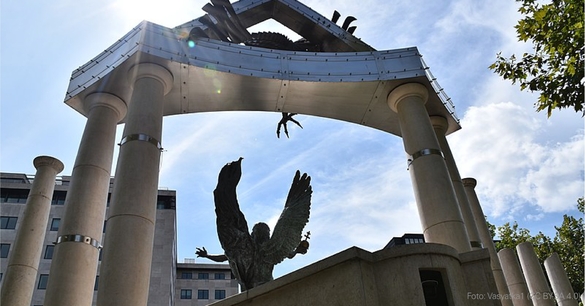
The research area also investigates counter movements, especially the role of socially engaged art and cultural activities rooted in civil society as an alternative, opposition to and integral part of governance formations. In addition, the emergence of meta-discourses around cultural policy like “New Cultural Policy”, “Audience Development”, “The Culture Wars” or “Resistance to Modernity and Western Decadence” – a slogan of the right-wing populist Polish PIS government. How are these discourses produced and how do they become effective in the cultural policy field? What influence do they have on funding decisions?
Past Working Meetings in the Research Field “Transformation of Cultural Policy”:
The Future of European Independent Art Spaces in a Period of Socially Engaged Art (FEINART)
FEINART is a large-scale research project between university research in the field of political philosophy, art theory, art practice and curatorial studies and cultural management on the one hand and art institutions – primarily from the independent scene - on the other. Through this cooperation a first comprehensive interdisciplinary analysis of the role and function of socially engaged art in European democracies will be conducted. In this context, 11 young researchers (ESRs) will be trained in a PhD programme. Candidates will acquire academic and non-academic skills necessary to understand and actively shape a changing art and cultural landscape with all its challenges.
The selected partner organisations represent and exemplary cross-section of smaller and larger independent project spaces, art and cultural centers as well as laboratories and research centers. They deal with very different requirements and expectations. All of them, however, provide indispensable starting points and resources for artists working in the field of socially engaged art.
The PhD training
programme provides valuable information about distribution, effects and role of
socially engaged art. It analyses funding and financing needs, involving the
development of recommendations for governmental funding of those artistic
practices.
Prof John Roberts, University of Wolverhampton, Coordinator | Prof Dr Karen van den Berg, ZU, chairwoman of the supervisory board & training coordinator | Björn Þorsteinsson, Háskóli Íslands | Dr Angela Dimitrakaki, University of Edinburgh
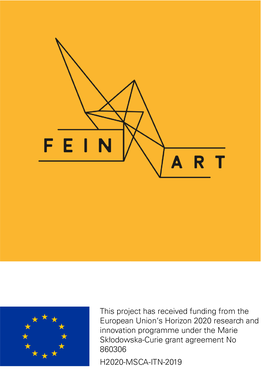
Selected Publications in Cultural Policy Research
- Steigerwald, Claudia (2021). Shaping Cultural Policy Discourse in Germany: The Case of ‘Cultural Education’, International Journal of Cultural Policy. Further information
- Tröndle, Martin / Rhomberg, Markus (2011). Cultural Policy Discourses in the Media: How German Mass Media Represent the Public Debate on the Future of the Classical Concert. International Journal of Cultural Policy, 17(5), 538-554. Further information
- Steigerwald, Claudia (2019). Kulturelle Bildung als politisches Programm. Zur Entstehung eines Trends in der Kulturförderung, Bielefeld, transcript. Publisher website
- Tröndle, Martin / Steigerwald, Claudia (Ed.) (2019). Anthologie Kulturpolitik – Einführende Beiträge zu Geschichte, Funktionen und Diskursen der Kulturpolitikforschung, Bielefeld, transcript, 700 pages. Publisher website
- Tröndle, Martin (Ed.) (2017). Die Kulturkonzeption: Stadtentwicklung und Kulturpolitik am Beispiel der Stadt Ravensburg, Wiesbaden, Springer VS, 362 pages. Publisher website
- Claudia Steigerwald (2013-2018) | “Kulturelle Bildung als Programm: Die Idee einer ‚Bildung durch Kultur‘ von der Neuen Kulturpolitik bis heute”
(Cultural Education
as a Programme: The Idea of ‘Education through Culture’ from the ‘New Cultural
Policy’ to Today)
| Further information
Artistic Research
Many research teams include artists who contribute to and productively irritate the research processes with their specific competences and epistemic practice. Both “eMotion- mapping museum experience” and “ECR - Experimental Concert Research” have sought to develop novel approaches and experimental ways to present research results that would not have been possible using scientific methods alone, and have thereby created different forms of knowledge.
Selected Publications in Artistic Research
- Tröndle, Martin / Greenwood, Steven / Ramakrishnan, Chandrasekhar / Tschacher, Wolfgang Kirchberg, Volker / Wintzerith, Stéphanie / van den Berg, Karen / Omlin, Sibylle / Kartadinata, Sukandar / Vaillant, Christophe / Reed, Patricia / Seeger, Mauritius / Viola, Enrico / Schmidt, Valentin / Rammelt, Roman / Alavi, Behrang / Karl, Nicolai / Wäspe, Roland (2011). The Entanglement of Arts and Sciences: On the Transaction Costs of Transdisciplinary Research Settings. In: Journal for Artistic Research. Vol.1, 1-29. Further information
- Schindler, Johanna (2018). Subjectivity and Synchrony in Artistic Research – Ethnographic Insights, Bielefeld, transcript, 182 pages. Publisher website
- Tröndle, Martin / Warmers, Julia (Ed.) (2012). Kunstforschung als ästhetische Wissenschaft. Zur transdisziplinären Hybridisierung von Wissenschaft und Kunst, Bielefeld, transcript, 365 pages. Publisher website
- Tröndle, Martin / Greenwood, Steven / Ramakrishnan, Chandrasekhar / Uhde, Folkert / Egermann, Hauke / Tschacher, Wolfgang (2020, in print). Integrated Methods. A pledge for integrative and interdisciplinary research, in: Oshin, Vartanian / Nadal, Marcos: The Oxford Handbook of Empirical Aesthetics, Oxford: Oxford University Press
- Tschacher, Wolfgang / Bischkopf, Jeannette / Tröndle, Martin (2011). Zwei Kulturen des Wissenschaftssystems? Betrachtungen aus dem Kunstprojekt eMotion. In: Brunner, Ewald Johannes / Tschacher, Wolfgang / Kenklies, Karsten (Ed.): Selbstorganisation von Wissenschaft. Jena: IKS Garamond Verlag, 57-73.
- Johanna Schindler (2013-2017) | “Subjectivity and Synchrony in Artistic Research – Ethnographic Insights” | Further information




